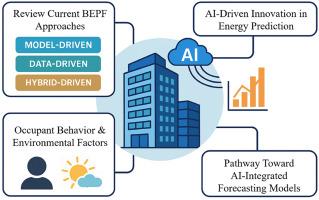A systematic review of building energy performance forecasting approaches
IF 16.3
1区 工程技术
Q1 ENERGY & FUELS
引用次数: 0
Abstract
Building energy performance forecasting (BEPF) is an active area of research with the potential to improve the efficiency of building energy management systems, support global sustainability goals, and mitigate climate change impacts. This systematic review examines three main prediction methods: model-driven, data-driven, and hybrid-driven, each with different principles, basics, advantages, disadvantages, practical applications, challenges, and limitations in addressing the complexities of building energy performance. The review focuses on key influencing factors, including building features, climatic conditions, and occupant behavior, while identifying critical research gaps in current methodologies. Through a bibliometric analysis of 95 relevant publications from 2019 to 2024, this review provides a quantitative overview of research progress and emerging trends. Findings indicate that although BEPF techniques have evolved rapidly, most studies continue to overlook the variability and complexity of occupant behavior, a factor with significantly affects forecast accuracy. To address this, we propose a modular AI-integrated forecasting framework that leverages the strengths of existing approaches, integrates real-time IoT data, and incorporate advanced artificial intelligence techniques, such as generative Artificial Intelligence, reinforcement learning, and Large Language Models (LLMs). A decision-making framework is also introduced to guide method selection based on specific building characteristics, data availability, desired accuracy, and operational goals, offering practical guidance for engineering and policy applications. Additionally, future research should extend beyond individual building dynamics to include a wider range of community-level determinants, such as policy frameworks, economic factors, and social determinants of health considerations (SDOH), aiming for a more comprehensive understanding of building energy consumption patterns. This review not only synthesizes current knowledge but also lays the foundation for future innovations in BEPF. We advocate for moving towards an AI-enhanced, adaptive forecasting model that can integrate different driven methods, capture the variability and unpredictability of occupant behavior, and improve the accuracy and reliability of energy forecasts.

建筑能源性能预测方法的系统回顾
建筑能源性能预测(BEPF)是一个活跃的研究领域,具有提高建筑能源管理系统效率、支持全球可持续发展目标和减轻气候变化影响的潜力。本系统综述考察了三种主要的预测方法:模型驱动、数据驱动和混合驱动,每种方法在解决建筑能源性能的复杂性方面都有不同的原理、基础、优点、缺点、实际应用、挑战和限制。该综述侧重于关键的影响因素,包括建筑特征、气候条件和居住者行为,同时确定当前方法中的关键研究空白。本文通过对2019年至2024年95篇相关出版物的文献计量分析,对研究进展和新兴趋势进行了定量概述。研究结果表明,尽管BEPF技术发展迅速,但大多数研究仍然忽视了乘员行为的可变性和复杂性,这是一个显著影响预测准确性的因素。为了解决这个问题,我们提出了一个模块化的人工智能集成预测框架,该框架利用现有方法的优势,集成实时物联网数据,并结合先进的人工智能技术,如生成式人工智能、强化学习和大型语言模型(llm)。本文还介绍了一个决策框架,以指导基于特定建筑特征、数据可用性、期望的准确性和操作目标的方法选择,为工程和政策应用提供实际指导。此外,未来的研究应超越单个建筑动态,包括更广泛的社区层面决定因素,如政策框架、经济因素和健康考虑的社会决定因素(SDOH),旨在更全面地了解建筑能耗模式。这篇综述不仅综合了当前的知识,而且为BEPF的未来创新奠定了基础。我们提倡采用人工智能增强的自适应预测模型,该模型可以整合不同的驱动方法,捕捉乘员行为的可变性和不可预测性,并提高能源预测的准确性和可靠性。
本文章由计算机程序翻译,如有差异,请以英文原文为准。
求助全文
约1分钟内获得全文
求助全文
来源期刊

Renewable and Sustainable Energy Reviews
工程技术-能源与燃料
CiteScore
31.20
自引率
5.70%
发文量
1055
审稿时长
62 days
期刊介绍:
The mission of Renewable and Sustainable Energy Reviews is to disseminate the most compelling and pertinent critical insights in renewable and sustainable energy, fostering collaboration among the research community, private sector, and policy and decision makers. The journal aims to exchange challenges, solutions, innovative concepts, and technologies, contributing to sustainable development, the transition to a low-carbon future, and the attainment of emissions targets outlined by the United Nations Framework Convention on Climate Change.
Renewable and Sustainable Energy Reviews publishes a diverse range of content, including review papers, original research, case studies, and analyses of new technologies, all featuring a substantial review component such as critique, comparison, or analysis. Introducing a distinctive paper type, Expert Insights, the journal presents commissioned mini-reviews authored by field leaders, addressing topics of significant interest. Case studies undergo consideration only if they showcase the work's applicability to other regions or contribute valuable insights to the broader field of renewable and sustainable energy. Notably, a bibliographic or literature review lacking critical analysis is deemed unsuitable for publication.
 求助内容:
求助内容: 应助结果提醒方式:
应助结果提醒方式:


